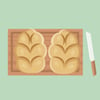A new program in Chicago offers young adults with special needs the chance to make and sell challah at a kosher bakery.
Tzippy Dukes, who started “Loaves of Love” earlier this year, partnered with the local franchise Breadsmith in Skokie, a suburb of Chicago, to offer the program as part of the Chabad-run Friendship Circle of Illinois. Dukes, who has a brother with special needs, used to volunteer for Friendship Circle when she was in high school.
“I enjoy baking, and a program like this is needed in the community,” says Dukes, who is now married with children. “It’s nice for young people to be able to have these experiences to prepare them for getting a job later on, as well as develop friendships and social skills.”
Rabbi Zelik Moscowitz, who directs the Stuart I Raskas Friendship Circle of Illinois, says “participants are able to acquire skills such as mixing, measuring, weighing and shaping the loaves. They are encouraged to arrive on time and work efficiently. Additionally, they get to interact with the community at large.”
Dukes serves as the coordinator, with help from two volunteers. The initial session included three participants who went to the bakery eight separate times in March and April. A new session will start in June after Shavuot.
“My son Asher absolutely loved this program!” declares Rivkah Kaplan of West Rogers Park in Chicago. “He looked forward to it every single week. What a wonderful opportunity to work in a prominent bakery and have their very own products sold.”

Other “Loaves of Love” programs either currently exist or have sprouted up at Friendship Circle locations around the country. Dukes says she modeled hers off the one in Detroit, called “Friendship Bakery.”
Bassie Moscowitz, co-director of the Friendship Circle of Illinois, says that it’s already met with success: “We received a great response from community members, who are thrilled to have the special-needs population integrated within the community.”
Pride in Their Work
During the process, participants discuss cleanliness, measuring and mixing ingredients, and braiding with three and four strands of dough. “I ask them what they know and what they want to learn,” says Dukes.

After baking, they bag and label the challah, sign their names on the labels and then sell the loaves to customers. The participants even have their own cash register, with the bakery giving the proceeds to Friendship Circle. Any leftover challah is sold to the community at large. Dukes, with the help of her children, will deliver it to nearby homes, as well as bring some to the Chabad cheder and local Jewish schools.
Dukes makes it a point to offer in-depth feedback to parents, evaluating the progress of their children—both their achievements and skills that need to be improved. She notes that much interest has been expressed for the next session, which will include new faces along with the existing group.
“I felt honored” to be part of the program, says participant Elizabeth Gottlieb, 27. “It will help me find a job near me.”
“They learned a lot,” attests Dukes. “Our bakers take pride and gain confidence in their work. They were very, very proud. That is the ultimate accomplishment.”














Join the Discussion